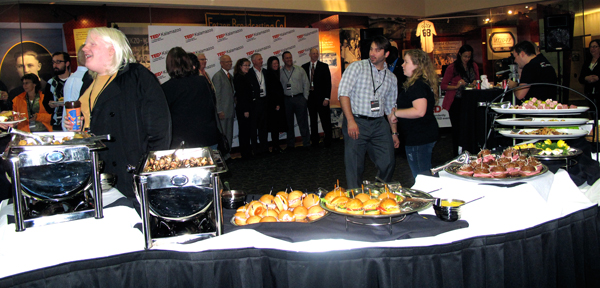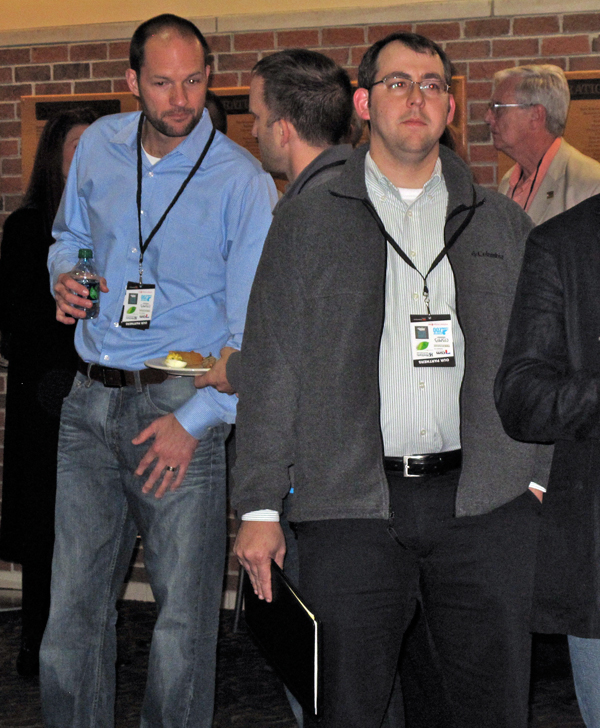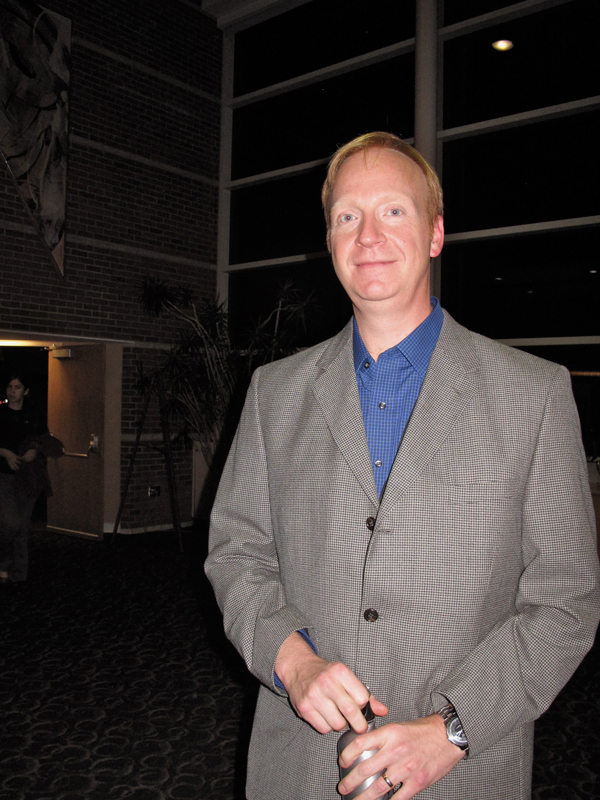A smorgasboard of ideas from TEDx Kalamazoo
There just may be some new ideas under the sun and some of them can be a call to action. At TEDx Kalamazoo they wanted to not just share ideas but to have them bring about change. Here's what happened.
At Second Wave we like stories about ideas. So we were there when TEDx Kalamazoo invited five people to talk about ideas that could spur people to action.
Here is a sampling of those ideas:
Paul Stermer
The executive director of the local food and sustainability organization Fair Food Matters told the TEDx audience that the nation’s food system is broken and most likely unsustainable. But there is a revolution going on that can undo two generations of corporate-driven excess.
Together we can create a new system for delivering food that is fair, just and healthy, Stermer says.
Signs of emerging change can be seen in the growing numbers of farmers markets, the availability of gluten-free food items, and that even big box stores are offering organic and other foods that are better for consumers to meet demand.
“What resonates with me is the social benefits of good food,” Stermer says. “When we grow, prepare, and share food we break down social barriers.”
Stermer offered a cookbook full of steps many can take so they can “do good by eating well.”
People can grow food and raise hens in their backyards, talk to farmers or volunteer to work on a local farm. They can make family dinners sacred, bake a pie and sit it on a window sill, find grandmother’s recipe book and use it, bake beets.
“Eat real honey, real maple syrup and more kale.”
Sean Ainsworth
Chief executive officer of RetroSense Therapeutics and founder of Ainsworth BioConsulting talked about his fascination with engineering good genes with viruses.
After 20 years of looking for such a therapy, Glybera has been approved in Europe. It is used to treat a disease that affects only several hundred people in the European Union and a similar number in North America. Ainsworth says people with the disease, lipoprotein lipase deficiency, have a genetic mutation that prevents them from producing an enzyme needed to break down certain fat-carrying particles that circulate in the bloodstream after meals.
Approval of the treatment is a landmark in gene therapy.
“Why is this exciting?” Aisworth asks. “This is the culmination of decades of research.”
Charlie Wollborg
The founding partner of Curve Detroit says he “loves the smell of possibility in the morning.”
Wollborg talked about the life cycles of ideas. “Ideas are perishable. When an idea visits, you have to do something with it, to go create something.
“We’re only rewarded for what we finish,” Wollborg says. “If you don’t bring your big idea to life that idea will go find someone else who will.”
For those who want to be innovators, Wollborg says to look at how something has developed from the time it began and turn it on its head.
One of his favorite examples is the Dum Dum sucker. The company, realizing it was losing money whenever it shut down the production line to clean it when it changed from one flavor to another came up with an innovative solution. It created a mystery sucker that combines flavors. “The mystery pop. That’s innovation. What is it in your industry that you are throwing away as scrap? That’s where innovation lives.”
Wollborg poked fun at the idea of the elevator pitch suggesting they may work in Dubai where there are tall buildings and long elevator rides. “How tall is the tallest building in Kalamazoo?” he asks.
What is more important is to find the spark of the idea and talk to people about it in a way that leaves them saying, tell me more.
“When we meet thinkers and doers they are optimistic because they are creating. You, the people in this room, are those kind of people. Go out there and make it happen.”
Dr. William J. Ward
The Social media professor at the S.I. Newhouse School of Public Communications at Syracuse University says the classroom of today and 100 years ago are virtually unchanged.
What he tries to do and what he believes will improve education is when the walls of the classroom are expanded to include the world through the use of technology. Instead of requiring his students to turn off their cellphones and put away their lap tops, he encourages them to engage with the internet and bring in information they find as the lesson proceeds.
He rewards students for contributing in this way and finds they compete to be the ones adding the most to the lesson.
He talked about the need to educate students in this way because of Digital Darwinism — the evolution of consumer behavior when society and technology changes faster than most people can adapt.
Education that employs technology can allow students to keep up with the rapid pace of change.
He also says 50 percent of companies require social media skills but young people are not being trained to fill those jobs.
And companies today are looking for employees with different skill sets than those previously required. Ward quoted John Seely Brown of Deloitte’s Center for the Edge, saying: “I would rather hire a high level World of Warcraft player than someone with an MBA from Harvard.”
A classroom with permeable walls, one that allows access to the entire world, allows for industry and other thought leaders to enter the classroom. Conversations can take place seven days a week, data regarding participation is accessible, and collaboration is fostered.
“Why aren’t we doing this for our students?” he asks.
Ken Kousky
The executive director of the BlueWater Angels Investment Network and chief executive officer of the MidMichigan Innovation Center told the group that job creation has become so slow in the U.S. because startup companies can not get the money they need to get off the ground.
Before the country’s economic slide, startups typically first turned to what is called the three Fs: Family, friends, and fools. When those people could no longer get money through home equity loans and the like, there were few options for the would-be entrepreneur.
Angel Investors are not enough to make up the amount of funding needed.
But under the federal Jobs Act that went into effect this year business startups can now solicit investors in some cases where it previously was prohibited.
“This will help get bankers out of the middle.”
With that the assembled TEDx crowd was encouraged to “go out and actually do something.”
Kathy Jennings is the managing editor of Southwest Michigan’s Second Wave.

















